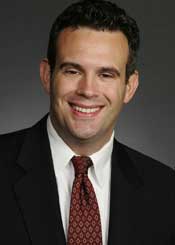Oklahoma adopts strong anti-SLAPP law
There's one more reason for Oklahomans to celebrate April 22.
 Last Tuesday, on the 125th anniversary of the Oklahoma 1889 Land Run, Gov. Mary Fallin signed HB 2366, the Oklahoma Citizens Participation Act, giving Oklahomans valuable protection in the exercise of their First Amendment rights. From the bill:
Last Tuesday, on the 125th anniversary of the Oklahoma 1889 Land Run, Gov. Mary Fallin signed HB 2366, the Oklahoma Citizens Participation Act, giving Oklahomans valuable protection in the exercise of their First Amendment rights. From the bill:
The purpose of the Oklahoma Citizens Participation Act is to encourage and safeguard the constitutional rights of persons to petition, speak freely, associate freely and otherwise participate in government to the maximum extent permitted by law and, at the same time, protect the rights of a person to file meritorious lawsuits for demonstrable injury.
HB2366 was authored by State Rep. John Trebilcock (R-Broken Arrow) and is a fitting capstone to his twelve years in the Legislature. State Sen. Rick Brinkley (R-Owasso) shepherded the bill through the Senate. Reps. Mike Turner (R-Edmond), Sally Kern (R-Oklahoma City), and Jadine Nollan (R-Sand Springs) joined as co-authors. The bill was approved unanimously by the House Judiciary Committee (14-0), the whole House (94-0, with 7 excused), the Senate Judiciary Committee (6-0), and the whole Senate (42-0, with 6 excused).
When the bill goes into effect on November 1, Oklahoma will have one of the strongest anti-SLAPP laws in the nation.
Ken White, a California 1st Amendment attorney, ably sums up the case for anti-SLAPP bills like HB2366:
The bottom line -- without an anti-SLAPP statute, a malicious litigant can often inflict substantial expense and hardship upon someone in retaliation for their speech, even if their claim lacks merit, and do so with relative impunity.
Some key points:
1. In a Strategic Lawsuit Against Public Participation, a plaintiff seeks to punish the defendant for expressing his opinion or stating a fact he doesn't like aired publicly by subjecting him to a costly legal process. The SLAPP plaintiff can achieve his objective -- silencing criticism -- even if he ultimately loses his case in court. The cost in time, money, and anxiety of defending the lawsuit will deter the defendant from future criticism and may also deter others from speaking out.
2. SLAPPs not only threaten political bloggers and newspaper reporters, but consumer watchdog groups and reviewers on sites like Yelp and TripAdvisor have been hit with SLAPPs as well.
3. The U. S. Supreme Court has issued many decisions protecting 1st Amendment rights by restricting lawsuits against written and spoken expression. For example, proving libel against a public figure requires that you prove the defendant knew he was lying or had a reckless disregard for the truth. But in practical application these protections come into play only at the end of the process, when the judge makes his ruling, or perhaps not until the case is heard by an appellate court. Even if the defendant prevails in the end, the damage has been done.
4. SLAPPs hit hardest when the SLAPPer has ample resources to sustain the prosecution of a lawsuit but the SLAPPee has to choose between (A) possible bankruptcy to defend the suit all the way to the end or (B) an undesirable settlement, which may include a promise to silence his criticism.
In response to this situation, Oklahoma has now become one of a number of states that have passed strong anti-SLAPP legislation to shift consideration of First Amendment protections to the beginning of the process and to deter malicious lawsuits by imposing costs on the plaintiff if the suit is dismissed. An effective anti-SLAPP law acts as an equalizer to ensure that you don't need a vast financial reserve in order to exercise your First Amendment rights, but it still provides for redress of valid defamation claims.
What the Oklahoma Citizens Participation Act does:
The Oklahoma Citizens Participation Act authorizes a special motion to dismiss to be filed and heard early in the process. The motion must be filed within 60 days after the suit is filed, and discovery is suspended until the court rules on the motion. The hearing on the motion must be held within 60 days of its filing, (The time may be extended to 90 or 120 days under special circumstances, but 120 days is the limit.) After the hearing, the court has 30 days to rule.
The defendant must first establish that the suit is based on, relates to, or is in response to his exercise of his freedom of speech, freedom to petition government, or freedom of association.
In response, the plaintiff must establish "by clear and specific evidence a prima facie case for each essential element of the claim in question." The defendant can obtain dismissal of the case if he can establish "by a preponderance of the evidence each essential element of a valid defense" to the plaintiff's claim.
What makes this different from an ordinary motion to dismiss is that the judge can go beyond "the four corners" of the complaint. The court doesn't have to take the plaintiff's charges at face value.
If the court dismisses the case, the court is required to award court costs, reasonable attorney fees, and legal expenses as well as sanctions "sufficient to deter the party who brought the legal action from bringing similar actions."
If the motion to dismiss is "frivolous or solely intended to delay," the court may award costs to the plaintiff.
Either side can appeal the court's ruling, and the appeal must be expedited; otherwise the benefit of an early motion would be neutralized.
Who is helped by the Oklahoma Citizens Participation Act?
- Newspapers, radio and TV stations, and news bloggers, particularly smaller news outlets which may not have the resources to fight lawsuits.
- Participants in online forums who express their opinions about public issues.
- Consumer protection organizations that rate businesses. The Texas law has been used successfully several times to block SLAPPs brought against such organizations by businesses angry about negative ratings.
- Consumers who register their opinions about experiences with local businesses on sites like Facebook, Twitter, Yelp, Urbanspoon, TripAdvisor, and Angie's List.
- The general public, who enjoy a greater flow of information about matters of public interest because the groups listed above are not intimidated by the threat of SLAPPs.
Some history:
Previously, Oklahoma had a very limited anti-SLAPP provision, covering only libel, but not other causes of action used in SLAPPs (like "tortious interference" or "conspiracy"), and covering only speech related to government proceedings. Oklahoma's law lacked any form of early review that could spare an unjustly charged defendant from a lengthy and costly process. It also lacked any mandatory provision to require the plaintiff in an unwarranted lawsuit to make the defendant whole for the costs of his legal defense. (Laura Long detailed the deficiencies of Oklahoma's statute in the Summer 2007 issue of the Oklahoma Law Review.)
In 1995, two trial lawyers filed suit in Creek County against members of Citizens Against Lawsuit Abuse, a group attempting to launch a tort reform initiative petition. The suit alleged defamation, tortious interference with business relations, intentional infliction of emotional distress, and conspiracy because CALA criticized trial lawyers as a profession in their letter soliciting steering committee members. The lawsuit dragged on for three years and went all the way to the Oklahoma Supreme Court. You can read a summary of the case here and the State Supreme Court decision here
The issue caught my attention way back in 2005 as one of a number of potential legal hazards for political bloggers. In 2006 and 2007, there were news stories about certain Islamic groups using libel suits to silence criticism or investigation of ties to hate groups and terrorist-supporting organizations, and KFAQ had to deal with a defamation suit from a city councilor.
In 2008, neighborhood activists opposed to the 10 N. Yale project faced legal threats from the Mental Health Association of Tulsa and Councilor Jason Eric Gomez. SLAPPs have even been used to target historic preservationists, simply for participating in the public process for approving or denying demolition permits or zoning changes.
In 2009, State Sen. Tom Adelson filed a bill (SB742) to add anti-SLAPP protections modeled after California's law, but the bill died without a hearing in the Judiciary Committee.
In 2012, the Franklin Center for Government and Public Integrity launched the "Protect Your Voice" initiative to push for legislation giving citizen journalists the same protections as traditional journalists in mainstream media.
 Last fall, during the legislature's pre-filing period, Rep. Trebilcock put out a request for suggestions for legislation he should author during his final session in the legislature. I suggested anti-SLAPP legislation, and that was one of the bills he decided to pursue. I passed the research I had done on to Rep. Trebilcock, and he took it from there. Not wanting any animus toward me (particularly over my National Popular Vote coverage earlier in the session) to get in the way of a good idea, I kept a low profile on the bill, although I was happy to have the opportunity to answer questions from a few legislators.
Last fall, during the legislature's pre-filing period, Rep. Trebilcock put out a request for suggestions for legislation he should author during his final session in the legislature. I suggested anti-SLAPP legislation, and that was one of the bills he decided to pursue. I passed the research I had done on to Rep. Trebilcock, and he took it from there. Not wanting any animus toward me (particularly over my National Popular Vote coverage earlier in the session) to get in the way of a good idea, I kept a low profile on the bill, although I was happy to have the opportunity to answer questions from a few legislators.
The Oklahoma Citizens Participation Act is not the only landmark legislation Rep. Trebilcock has authored in his final session. HB2372, which protects the privacy of an employee's social media accounts from inspection by an employer, has passed the House and Senate unanimously, but in different versions. The Senate amendments are now pending in the House.
The Internet has created unprecedented opportunities for ordinary Oklahomans to make their voices heard. Thanks to Rep. Trebilcock, Sen. Brinkley, legislators of both houses and parties, the chairmen and members of the House and Senate Judiciary Committees, and Gov. Fallin, they can now make responsible use of those opportunities for the betterment of our cities, counties, school districts, and state, secure in their protection from malicious lawsuits.
0 TrackBacks
Listed below are links to blogs that reference this entry: Oklahoma adopts strong anti-SLAPP law.
TrackBack URL for this entry: https://www.batesline.com/cgi-bin/mt/mt-tb.cgi/7193
Thanks, Mike. This is the sort of "behind the scenes" work that maintaining freedom requires.